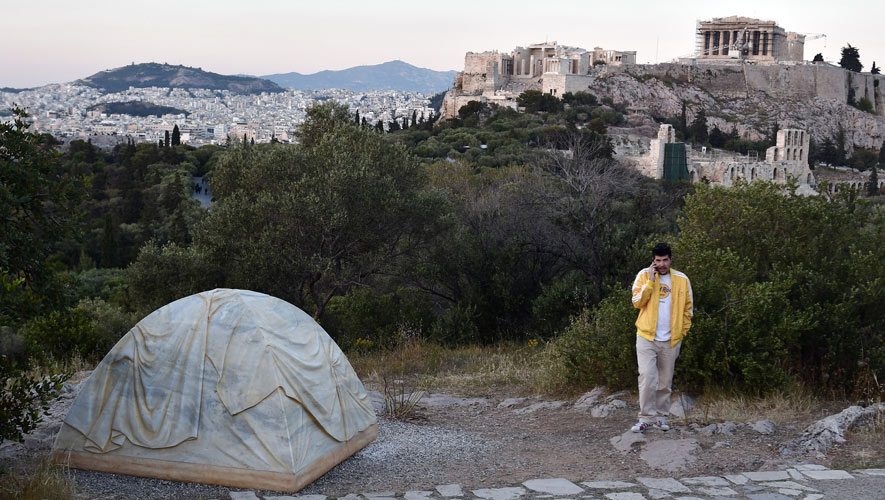Climate, population and living space are fundamental conditions for humankind to survive and thrive. Being an intercontinental sea that boasts waves gentler than usual, various winding coastlines and home to many isles, the Mediterranean Sea is a place blessed in an abundance of natural harbours, making it a key passageway within the international maritime trade route that links three major continents together.
For the latest Cambodian Business news, visit Khmer Times Business
History has it that when the earth turned cold, it drove its inhabitants away from the northern hemisphere and further down to the south of the equator, right where the Mediterranean Sea is located. Over time, the people who settled down around the Mediterranean Basin became the cradle of human civilisations. Consequently, this allowed its inhabitants to flourish in maritime trading, which then gave rise to important civilisations such as Ancient Egypt and Greece, and the Roman Empire. The Mediterranean coastline was home to the Phoenicians (now Lebanese), the Cretans, the Greeks and much later, the Portuguese and the Spaniards too, all who made up the flourishing maritime community. Coincidentally, it was also the birthplace of many famed explorers, such as Christopher Columbus and Vasco da Gama.
Europe can be seen as an extension of the Mediterranean Sea, brought to life by its technological advancement and culture. Historically speaking, civilisations never, if ever, thrive in higher latitude; it is impossible for humans to survive there given the harsh and brutal conditions of the land. That said, the global warming brought about by long years of industrial revolution and technological advancement has brought down the temperature in some parts of the land there and it eventually created habitable zones for people to live in. As a result of that, people begun moving away from the Mediterranean and further into the regions of higher latitude to settle down, where Europe eventually came to be.
Judaism, Christianity and Islam, three of the world’s largest religions, originated in the Mediterranean too before each respective religion’s followers decided to spread the teachings of their faith to the world’s end. From the spiritual level to the real world, the events in the Mediterranean has had a far-reaching impact on mankind.
The Mediterranean was not merely some pioneer of the world’s earliest human civilisations in history; it continues to play an important role in today’s modern society. Similarly to the past, every single occurrence that takes place in the Mediterranean determines the fate of the world.
At present, the Mediterranean is plagued with the issue of a massive shortage in its fish stocks. It is common knowledge to many that the world is currently experiencing a refugee crisis, and that the dwindling fish stocks is one of the causes. The Mediterranean’s fishing industry boomed in the mid-19th century, with the continent experiencing a steady growth in the number of fishes caught. Numbers reached 1.97 million tons of fishes in 1988. In 1991 however, the figure plummeted to 1.28 million tons and continued to worsen from thereon. This was largely due to the fact that there was a surge in demand for tuna, which translated to a hike in price. This resulted in the Mediterranean Sea seeing an increase in the arrival of foreign fishing vessels or ships in its waters using far more advanced technology far more advanced than their competitors to capitalise on the situation.
In response, many coastal states were forced to implement fishing laws banning the use of drift netting and longline fishing; an attempt to maintain a fair competition as well as to prevent a complete depletion in the continent’s fishing stock. To make matters worse, the issue was also further exacerbated through the severe environmental pollution happening in the Mediterranean, due to the erected water dams that have been obstructing the flow of river and stream currents into the ocean, which in turn raises the salinity in the Sea of Azov by a thousand times more. The rise in the sea’s salinity, coupled with the presence of a water dam, then deprived the fishes of the ability to reproduce and relocate their offspring efficiently, severely affecting the population of fish native to the Mediterranean.
Today, the Mediterranean’s fishing community is not only plagued with the issue of living in war-torn countries; they’re also dealing with the possibility of losing their jobs as a result of the depletion in the Mediterranean’s fishing stock. Many Libyans, Moroccans and Tunisians have now turned to smuggling refugees across the European borders to make a living, understanding that the fishing industry is sinking.
Apart from the human crisis, there is an ecological crisis, too. Many studies and reports have shown that our oceans, rather than teeming with fish, are drowning in plastic waste. In the case of the Mediterranean, desperate people have been left with no choice but to scavenge for plastics in exchange for money under the European environmental subsidies.
On a political level, the migrant caravan longing to gain access into Europe – and latterly America – in search of a better life, has sparked an aggressive and extreme reaction, particularly from right-wing parties. In a bid to keep the newcomers out, these parties have protested against the act of granting asylum to the refugees, either by shaping the order of the country or through amending the country’s law and trade rules or simply just changing the entire country itself.
But this is perhaps very short-sighted. After all, as we’ve already seen, the ebb and flow of events happening in the Mediterranean will continue to determine the fate of the world.




